Christopher Vogler's The Writer's Journey
The Mentor
The Mentor — arguably the second most identified archetype from The Hero’s Journey (after the eponymous hero). In his book, The Writer’s Journey, Christopher Vogler has a lot to say about the mentor: why they are important, what they do, what kinds of mentors there are, and whether you actually need one in your story (okay, the last one might just be us).
In this episode, Kim and Renee discuss these points using examples from Peter Beagle’s The Last Unicorn!
Also, if you like what you hear and read, consider supporting us with a TIP!
Mentor Gonna Mentor
Both a step in the Hero’s Journey and a Character Archetype, the Mentor “is expressed in all those characters who teach and protect heroes and give them gifts. Whether it’s God walking or talking with Adam in the Garden of Eden, Merlin guiding King Arthur, or the Fairy Godmother helping Cinderella, or a veteran sergeant giving advice to a rookie cop. . .the relationship between the Hero and the Mentor is one of the richest forces of entertainment in literature and film.”
Quite the high(ly male-centric) bar. . .but it’s one archetype that everyone can identify with because most people have or are a mentor at some point, which is why it’s such a universal archetype in storytelling.
Our Novel Approach to The Writer's Journey
We’ve chosen four novels to analyze while we read Vogler’s book, which will serve as examples to help you on your own journey to writing a novel based on the Hero’s Journey. Here’s what Kim & Renee are reading:
Psychological Function of The Mentor: Everything is Everything
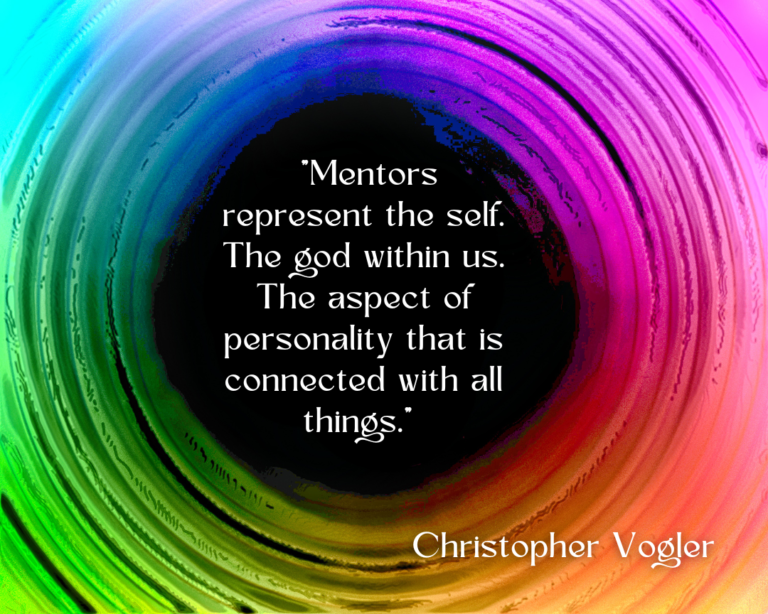
We should probably just rename the “Psychological Function” to “Hang Tight While Vogler Gets All WooWoo,” because it’s all borderline tautology at this point. So grab your crystals and hold tight to those Chakras ‘cuz we’re goin’ on a trip to the Metaphysical Bookstore!
“God within us?. . .”all things?” Right, Vogler, everything is everything, yadda yadda. Lacking any semblance of sense, he goes on to say: “this higher self is the wisest, nobler, more god-like [like WTF is he even talking about?!] part of us and that it’s the Hero’s highest aspiration.” Perhaps, by “aspiration” Vogler means Idol, or trusted teacher, because we highly doubt Marty McFly wants to turn into Doc Brown when he gets older. Or Bilbo into Gandalf. Or King Arthur into Merlin. Or Katniss into Haymitch. Or Cinderella into a Fairy Godmother.
Dramatic Function of The Mentor: Teaching
What you won’t get in this book (which Renee will complain about ad infinitum): examples, beyond name dropped outdated movies, like Beverly Hills Cop (holy coincidence, Batman! Beverly Hills Cop 4 just got released!) and Wizard of Oz. What you will get (which Kim appreciates): a book that breaks things up in easily digestible chunks.
So what’s the point of the Mentor? They teach the Hero skills, lore, and, like a tour guide, introduce the world beyond The First Threshold. The Mentor is there to push the Hero into the story and help them level up for the big bad.
Quick note: like bedbugs, Mentors can show up anytime. They need not appear at the start (although they are a step in the Journey). We’d imagine the later they appear, however, the more McGuffin the risk.
The Last Unicorn & The Mentor
Now onto our analysis of The Writer’s Journey from the lens of the characters in Peter S. Beagle’s The Last Unicorn. As discussed in the podcast, the Mentor’s Psychological Function doesn’t really apply, because the Unicorn as Hero doesn’t aspire to be a mentor; Unicorns don’t aspire to be anything other than what they are. She was born the pinnacle of perfection (and she knows it too).
Although the main cast: The Unicorn, Schmendrick the Magician, Molly Grue, and Prince Lir, all dip their toes in the Mentor pool, we will focus mostly on Schmendrick as the Mentor for the purposes of these SnarkNotes because he’s the one who knows where to find the Red Bull. He teaches the Unicorn about the humans’ world and aids her in her quest to find the rest of her kind. Later, he becomes almost a Mentor stereotype to Prince Lir.
Gift Giving
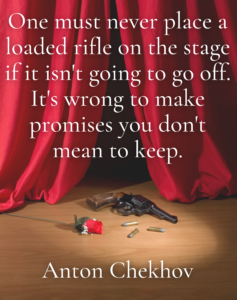
Grandparent-like on the surface (who comes bearing toys with noise), the Mentor is pretty generous, because most of the time the Hero starts quite green. Mentors are like the Fairy Godmother, hooking your protagonist up with sexy glass stilettos and lightsabers and magical maps and $h!+. The Mentor serves a function but also provides quite the narrative opportunity for the writer. Not sure how to get your Hero from point A to point B? Wondering how your Hero will slay the Gorgon? Give them a Mentor with the goods to move the plot along. Just try not to be so obvious about it…
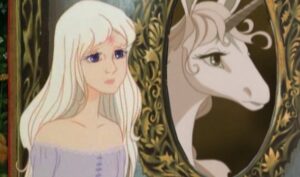
Schmendrik gives a few “gifts” to the Unicorn on her journey. On the podcast, we discuss how the wizard set the Unicorn free from Mommy Fortuna’s Circus. Ultimately, he turns the Unicorn into a human woman, which saves her (temporarily) from the Red Bull. While this spell is bittersweet (she almost forgets who/what she truly is), it gives her the opportunity she needs to defeat the Big Bad and free her Unicorn friends.
(Molly Grue also acts the Mentor for Prince Lir – you can hear our analysis on that in the episode).
Earning the Gift

Now don’t go spoiling the Hero, or they won’t really deserve either the quest or the victory. You have to make them work for it. Give the Hero a test or force them to learn a lesson. Make them sacrifice something dear to them or commit to a life altering task. Otherwise, your Hero will turn into an entitled brat.
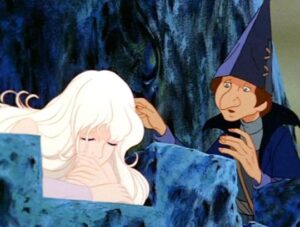
As for Schmendrick’s gift, the Unicorn “earns” it by trying, but failing, to evade The Red Bull. Consumed with fear, she eventually gives up and begins to allow the Bull to lead her to the sea. Schmendrick allows the magic “to do its will” and it does.
Mentor as Inventor (Isn't this a Type?)
Hero's Conscience 🦗🦗🦗
Y’know that nagging internal geriatric who wags their finger at you when you throw an aluminum can in the trash or roll on through the stop sign or trapse a vineyard drinking out of the spit wine bucket? Yeah.
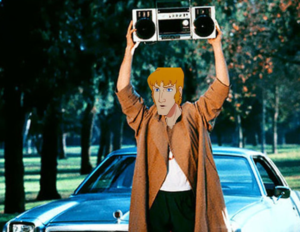
At the end of The Last Unicorn, Prince Lir refuses his kingly duties and decides to wander the Earth looking for the Unicorn like a lost puppy dog. Schmendrik, now in control of his magic, becomes the quintessential Merlin for Prince Lir. No, dude, you can’t spend the rest of your life looking for her. No, you have to stay here and be a king and stuff. No, Prince Lir, she’s not going to like you more if get drunk, bring a boom box to her house, and blast love songs from her front yard.
Motivation
In our first episode on the Hero’s Journey, we talk about the Refusal of the Call, in which a Hero tries to avoid going on the quest. But why? It’s a freakin’ adventure! There’s maidens to woo and dragon heads to collect and a magic ring to throw into a volcano. What’s not to want?
Fear. The answer is fear. The Hero is afraid and if they’re not you better up those stakes or the story’s not worth reading. That’s why there’s a Mentor to bully. . .we mean convince the Hero to overcome their fear. The Mentor can’t go on the adventure for the Hero (ex: Gandalf can’t touch the One Ring).
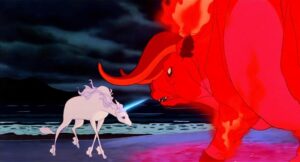
Schmendrick doesn’t need to convince the Unicorn to go on an adventure. Yet, through his “gift” (turning her into a human) he provides her the motivation she needs (the death of Prince Lir) to overcome her fear of the Red Bull and fight back.
Types of Mentors
It’s important to note some characters will wear the mask of other Character Archetypes (how convenient). Sometimes a sidekick will give the Hero some unexpected, critical advice. Sometimes a Mentor will stab the Hero in the back. Sometimes the love interest becomes the hero. Some Mentors aren’t always willing to be Mentors. In other words, Vogler comes up with all the reasons so his formula always (not really) fits.
First, A Rant from Kim
It’s at this point in Vogler’s book that Kim breaks stoic co-host persona and goes on quite the rant on the podcast. Vogler, she complains, just doesn’t capture the magic of the Mentor in literature. He doesn’t tell us why we love or identify with the Mentor, only how they function and what they do. Without examples or explanation, he skims the surface of their potential as a cookie cutter character who does little more than offer advice or gift weapons to the Hero.

Kim cites Gandalf as the example, pointing out we don’t love Gandalf because he sets Bilbo out on his Quest. We love him because he brings fireworks to Hobbit parties and makes Merry and Pippin do dishes as punishment. We thank him for standing over Frodo’s bed in Rivendell when he wakes from his bout with death. We witness Gandalf act the Hero when he fights Saruman and the Balrog. We grow cathartic when Gandalf consoles a frightened Pippin, watching the hoard at the gates of Minas Tirith (we dare you to watch this and not cry):
Essentially, it’s not (just) about the gift/advice/adventure giving; it’s about the character building relationships with the other characters and the plot.
Dark & Fallen Mentors
Not all Mentors are wise old dudes. Vogler describes two types of Mentors, either suspect with intentions for aiding the Hero or unfit, unreliable, and jaded to willingly help the Hero.
Dark Mentors, or what Vogler terms “Anti-Mentors,” are characters who wear the mask of a Mentor but sometimes act as a “decoy used to lure the hero into danger.” Think: Friendly Crime Boss. Or Fagin, leader of the pickpockets from Oliver Twist.
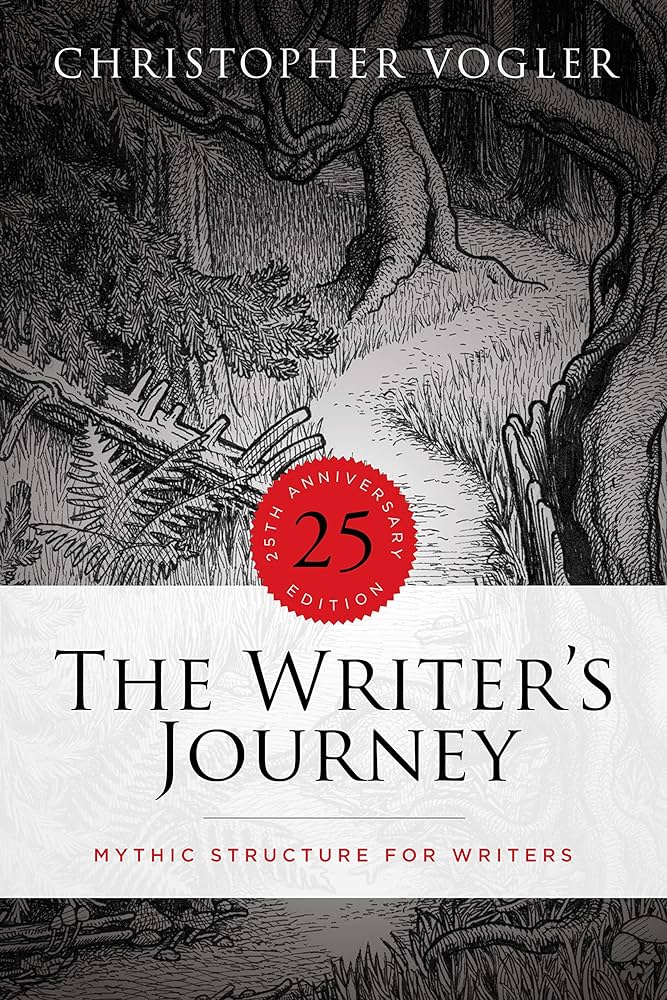
Addicts. Depressed. Bitter. Loners. Fallen Mentors are broken. They could be past Heroes who lost their way on a quest or Mentors who failed their Hero in some way or got them killed (like Batman in Frank Miller’s graphic trilogy, The Dark Knight Saga).
Continuing & Multiple Mentors
According to Vogler, “continuing Mentors are useful for giving assignments and setting stories into motion,” which is a great mentor to have if your Hero goes on episodic adventures. Hypothetically speaking, let’s say you scored a sweet five book deal from your publisher (like our co-host Kim Smuga-Otto!) and your Mentor survives the first book. Bring them back to give your Hero more advice and/or gifts and you’ll have yourself a Continuing Mentor!
Having Multiple Mentors allows different characters to wear the Mentor mantel in aid to the Hero, like in James Bond or a mix/match character sale at the Novel Emporium. Vogler states: “the Mentor is not a rigid character type, but rather a function, a job which several different characters might perform in the course of a story”. Yes, Kim, we know. Everything is everything.
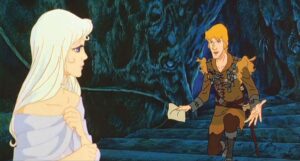
Schmendrick, Molly Grue, and Prince Lir all wear the Mentor mask (and not just for the Unicorn). Molly counsels Prince Lir on how to woo the woman he doesn’t know is a Unicorn. Prince Lir, as a professional Hero, teaches Molly and Schmendrick the role of the Hero.
Comic & Shaman Mentors
While the Fallen/Failed Mentor isn’t always much use to the Hero, the Comic wants to be of use but just isn’t. These two types of Mentors have nothing to do with one another, but we’re grouping them together for the sake of brevity. Then again, they’re both quite cliche in film and television, offering little in character growth or function, so there you go.
Vogler states a Comic Mentor can act as wing-person in a romantic comedy, helping the Hero in their quest for love, such as Emma in Jane Austin’s novel (although Emma’s the Hero). On the other hand of your father’s, brother’s, nephew’s, cousin’s, former roommate, you’ve got the Shaman Mentor, who takes the Hero on a vision quest (peyote, anyone?). On the episode, we discuss how vision quests can be considered lazy (and a bit racist) storytelling.
Inner Mentors
Like the lone Western Hero, this Mentor lives inside the Hero as a rigid Code of Conduct. Asimov used the Three Laws of Robotics as both a narrative constraint and the Hero’s programmed code of conduct in his Robot Series to make decisions throughout the story.
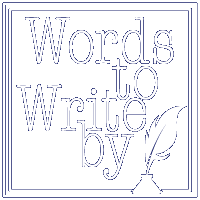
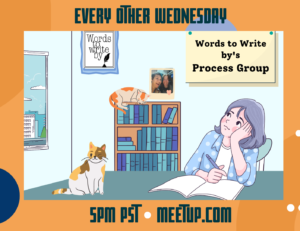
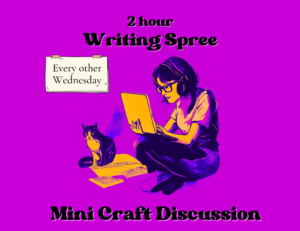
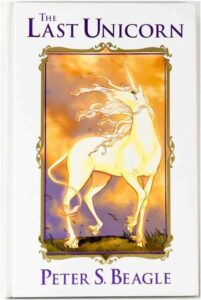
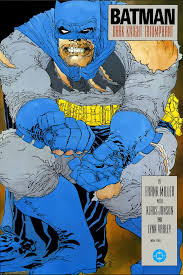
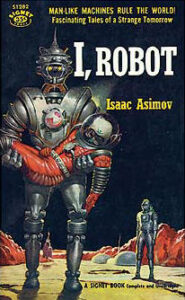
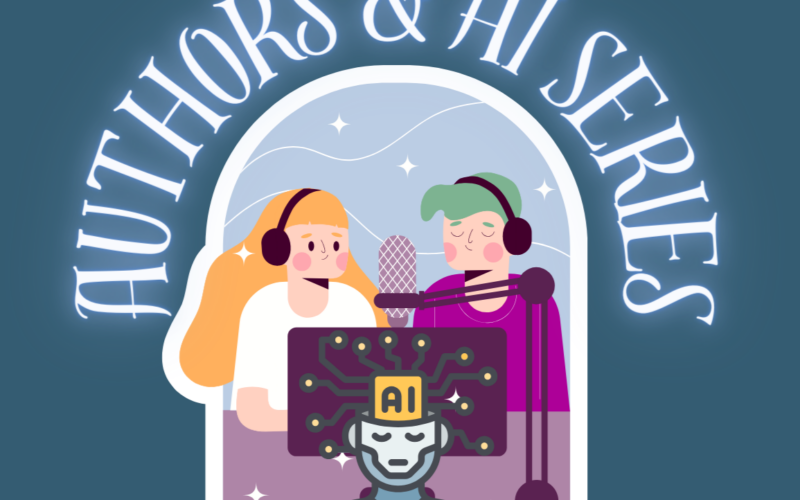
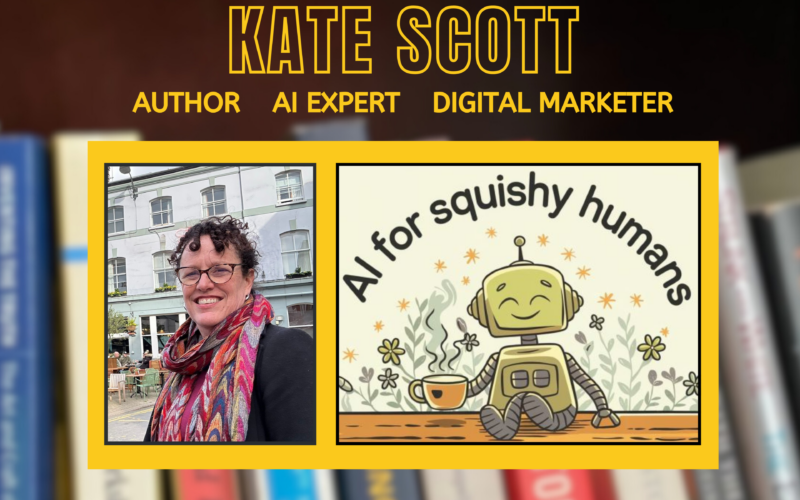

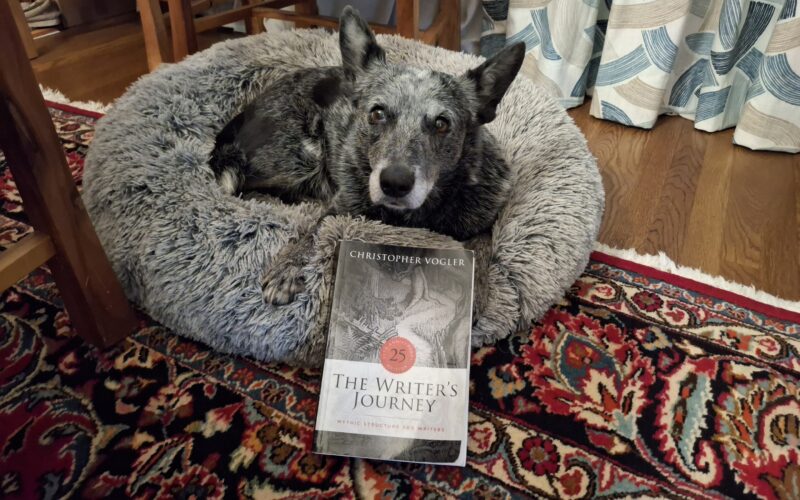
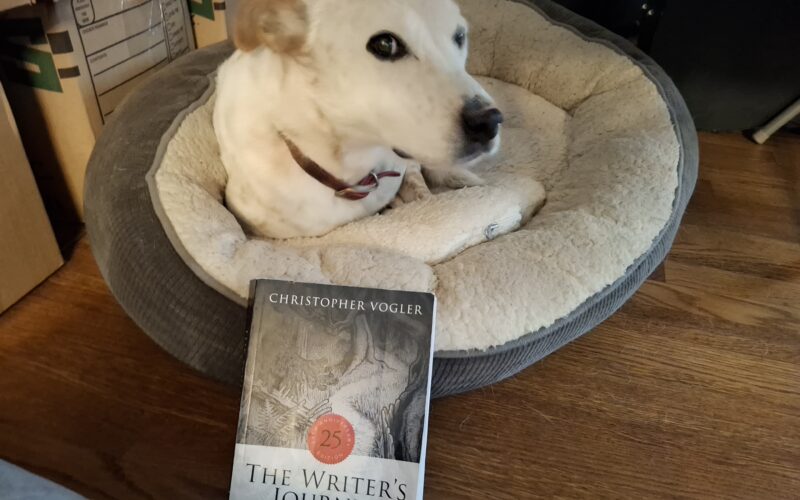
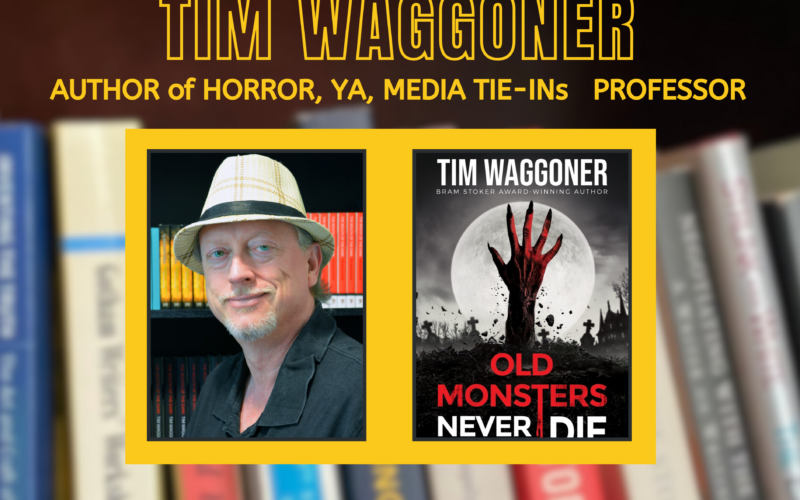
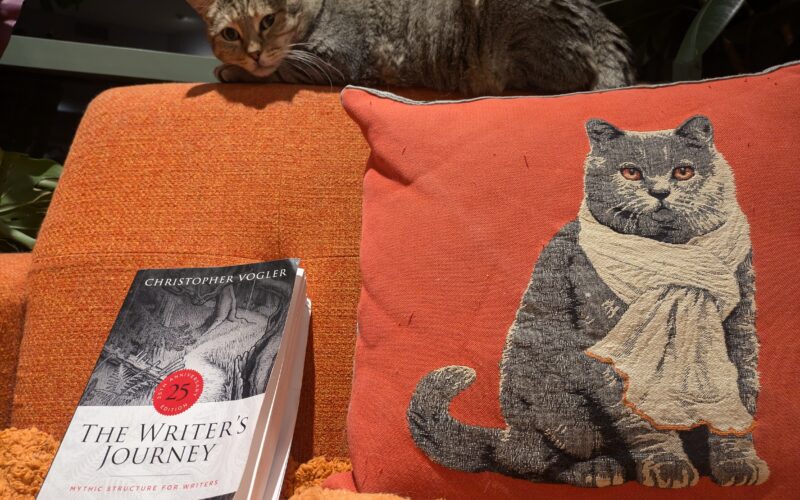
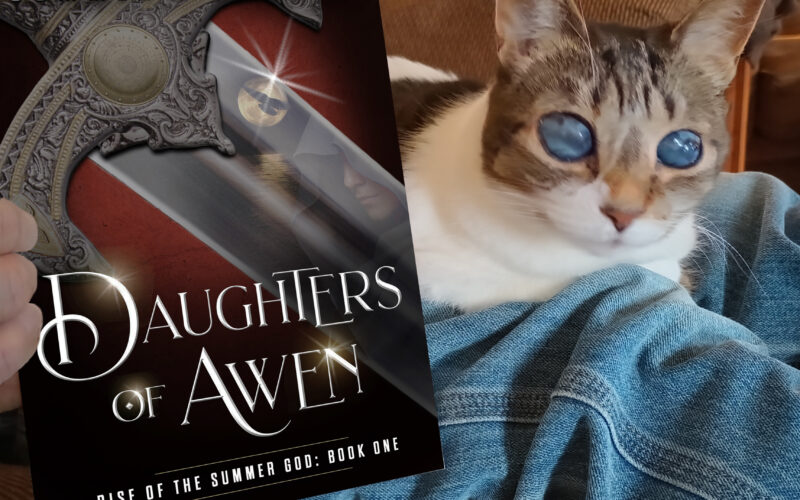

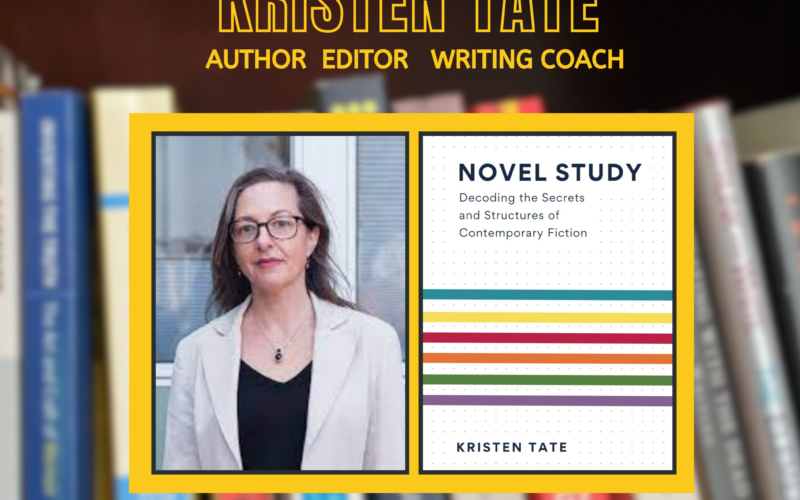
Not Your Usual Words to Write By: The AI Podcasting Challenge
Authors & AI SeriesEpisode 7: Not Your Usual Words to Write By: The AI Podcasting Challenge! Is nothing sacred? After exploring how AI might steal our writing jobs, we’re...